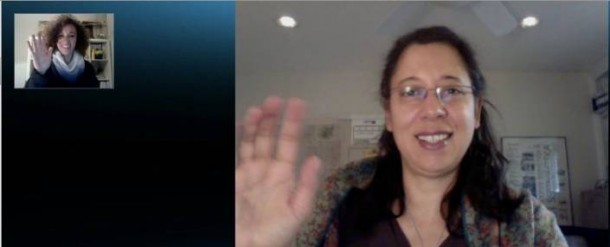MADRID, SPAIN. As part of our Expat Series, ROOSTERGNN conducted a third interview with expat Gwendolyn Alston, co-founder with sister Angela, of MocaMedia. Gwendolyn has lived in Madrid for over 20 years and has been involved with numerous independent projects. One in particular is a US-based business which she created while living here in Spain.
Where are you from originally? What brought you here to Madrid?
I’m originally from the Upper West Side in New York City. I came to Madrid to do a Masters abroad program through NYU 20 years ago.
Why did you move to Spain as opposed to other countries?
I had graduated from college and moved to New York to work. And I realized that if I stayed in New York, I would never leave.
I grew up spending summers in Spain — in other parts of Spain, not Madrid. So I’ve always kind of had this romantic idea that I’d really like to get to know Spain better. I thought the way that I could do this is to study there and bring my knowledge back to the States if I want to move back.
How would you briefly summarize what MocaMedia does?
Primarily we help independent filmmakers reach their audience and achieve their goals through marketing strategies.
What inspired you to create MocaMedia?
MocaMedia is the result of my and my sister’s combined experiences and strengths. I had already started two other businesses, after leaving my previous job as an editor in academic book publishing. My sister was a filmmaker. We spent 18 months working successfully on one film project and that led to one referral after another. Seven years later, here we are.
Where do you find your clients? How did the economic crisis affect your business?
The majority of our clients are in the U.S. — New York and California. I travel every two to three months back to New York to meet with them.
So although the crisis in the U.S. did affect us in that fewer people approached us or couldn’t afford us for a couple of years, we nonetheless continued to have clients.
I did perceive the effects of the crisis in Spain too, but this did not directly affect my business, as my business is not based here.
You mentioned that the majority of your clients are in the U.S. Is the market for your business not as big in Spain? Do you deal with your American clients from here in Madrid?
Independent filmmakers and artists in Europe in general are still very much dependent on public money from the state. There’s always been a tradition that it’s the government’s Ministry of Culture that provides funding and grants to help with projects. This is what Europeans are used to. There’s no concept here of going to friends or family for funding.
In the U.S. however, private or even self-funding is understood. There is a wider source for money. MocaMedia’s concept is not as understood in Europe; independent filmmakers in the U.S. know they need people like us to reach their target audience. Here in Europe, however, there’s the bureaucracy to overcome first.
So I communicate with my American clients and business partner/sister from here in Madrid. I know a lot of independent filmmakers here in Spain, however they just don’t have the resources to work with me.
What I do professionally here in Spain are other projects such as teaching.
Where do you see your business in the future? What digital strategies are you currently implementing?
My business is completely digital; all the work we do is online. So I just embrace this and all of the changes that come with it, while also trying to develop offline activity and networking. We are currently in the process of growing our business — acquiring new clients and collaborators to help us manage the different projects. Not just filmmaker clients, but also self-published authors and other content creators — artists in general.
What was your experience like settling into Madrid? What advice can you give to other expats settling into a foreign country?
Well, I did have a little bit of luck in that I already had a boyfriend. So we moved here together and found a place to live together. And he introduced me to his friends. But I was also studying at NYU getting my masters here, so I made friends there. I happen to be an extrovert anyway, so I was joining different groups or expat groups/activities. When I was getting my masters degree, I was teaching English.
I was also fluent in Spanish before I moved here. I spoke it growing up.
My advice to other expats is to get involved in all the different clubs and meet-up groups here. There are a ton of language exchanges at bars and cafés, where you can meet someone and speak English, for example, while they speak to you in Spanish. It’s a great way to date and make friends. You can look for them on Facebook or online.
What advice can you give to future expats looking to start a business in Madrid or Spain in general?
My advice to people seeking to set up a business in Spain is that they learn how to navigate bureaucracy with patience and to find someone who will be “human” with them. Spaniards or Europeans will always say no at first — they’re risk-averse. Business owners here are always working with bureaucracy.
It’s very important that entrepreneurs here have a really good business plan, especially with funding/accounting. You spend a lot of money on an accountant; you pay taxes and other expenses before you even earn anything.
It’s also important to find friends or consultants who understand the system very well and can advise. This is a difficult country in which to start a business and not to mention, an expensive one.

